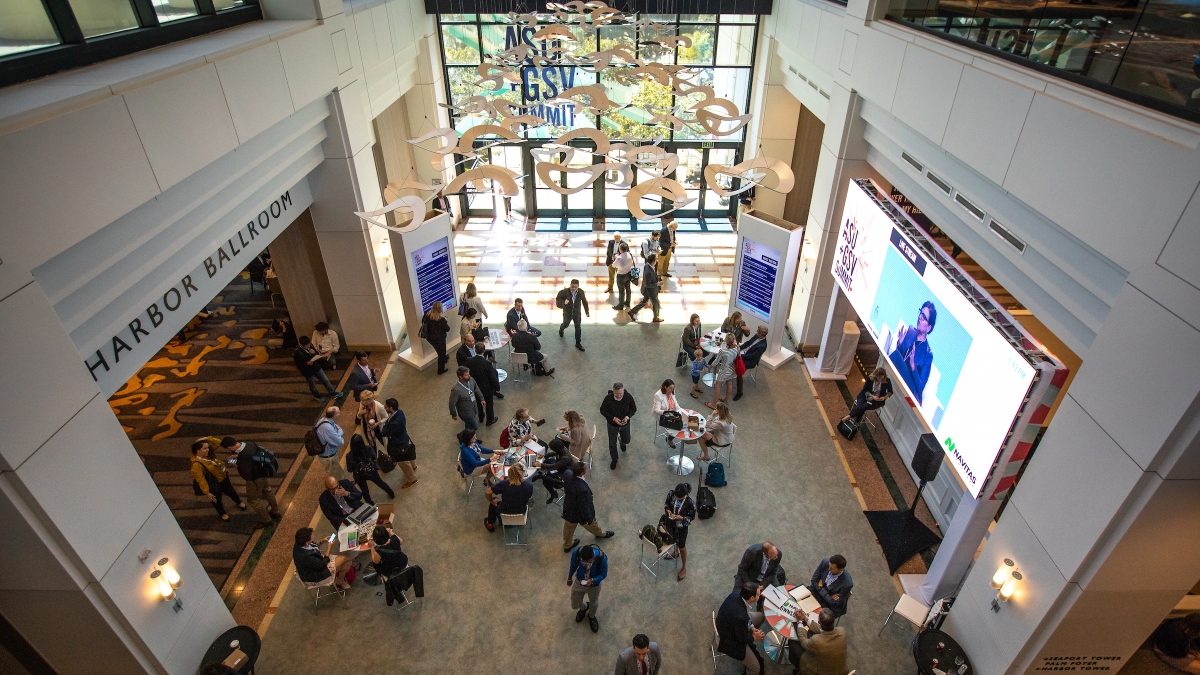The outlook for middle-skills jobs: Cross-sector panelists weigh in at ASU + GSV Summit

A few of the more than 4,000 attendees at the ASU + GSV Summit 2018 meet in one of the lobbies at the host hotel in San Diego. The summit attracts people from the enterprise, investment, higher education and PreK–12 communities. Photo by Charlie Leight/ASU Now
Editor's note: Read more of the highlights from the ASU + GSV Summit on our blog.
What will the future of work be like for people who want a middle-class lifestyle but no college degree? Several experts debated that in a panel titled, “What Will Middle-Skill Jobs Look Like in 2025?” at the ASU + GSV Summit in San Diego on Wednesday.
James Homer, senior vice president, Pearson AcceleratED Pathways: “Companies look at middle-skills jobs as a key imperative around capturing growth. They can be customer facing, back-office or service jobs. They require soft skills and the ability to interact with fellow employees and customers; they have to have technical skills to execute business functions. They are in many cases on the front lines to growth. As hotel chains have huge capital budgets to build more hotels, there’s an army of people they need to staff them. It cuts across every industry segment.
“There are huge segments of the work force who will be disintermediated through automation. For customers we talk to, there’s an imperative to streamline their business workflow, but they have to retrain their workforce to support that. Employers are not saying that all employees will be kept. But for a lot of employers, the number one job is identifying the skills needed and getting their employees there.”
Kristin Sharp, executive director, Shift: The Commission on Work, Workers, and Technology at New America/ Bloomberg: “The middle-skills jobs are ways to earn income that are nontraditional that get people to a middle-class lifestyle. It isn’t just working with your hands or having a certain level of education, it’s having a pathway or vision into a lifestyle that will support a family and give workers a sense of purpose. Because advanced technology platforms are changing the entry points into the workforce, nobody knows what that will look like. We need to redefine that.
“Often, the defining characteristic of what kinds of jobs will be available in the future is that they’re self-directed or motivated. The worker needs to take responsibility for finding the type of work they want to do, finding the skills that will get them there, connecting with those skills and proving that to an employer. That’s a very hard thing to figure out how to do. Workers like specific programs with employers.”
Jonathan Kestenbaum, managing director, Talent Tech Labs: “When you think of middle-skills labor, it’s people who have a hard time articulating their skill set to an organization. In some cases they don’t have a resume. It’s hard when an organization has a tracking system that only focuses on a resume. We’re starting to see some new tracking systems that don’t focus on a resume.
“There are skills-based assessments out there. There are game-based behavioral assessments that will show risk averse you are, etc. There are simulation-based assessments in which you actually go through a simulation of, for example, a call center to see if you’re a good fit. Candidates can test themselves to see what kind of job they fit into.”
Derek Apanovitch, president, Ultimate Medical Academy: “We’re a national online allied health institution focusing on administrative-type programs. Middle-skill jobs pay at least $15 an hour or more. The lower end of that could be medical coding, and the upper end could be surgical technicians, but below nursing. The bottom rung is home health aides. We’re often serving students who are at the bottom who want to move up to the middle. They want to improve their earning potential.”
More Business and entrepreneurship

New rankings show impact of ASU W. P. Carey School of Business
Good rankings for Arizona State University's W. P. Carey School of Business reinforces the school's commitments to access,…

Arizona Business and Health Summit asks attendees to innovate for value
Arizona State University's W. P. Carey School of Business hosted the third annual Arizona Business and Health Summit, sponsored…

An economic forecast with lots of variables
The prospect of a new presidential administration is prompting some discussions among top economists.Tariffs, immigration,…